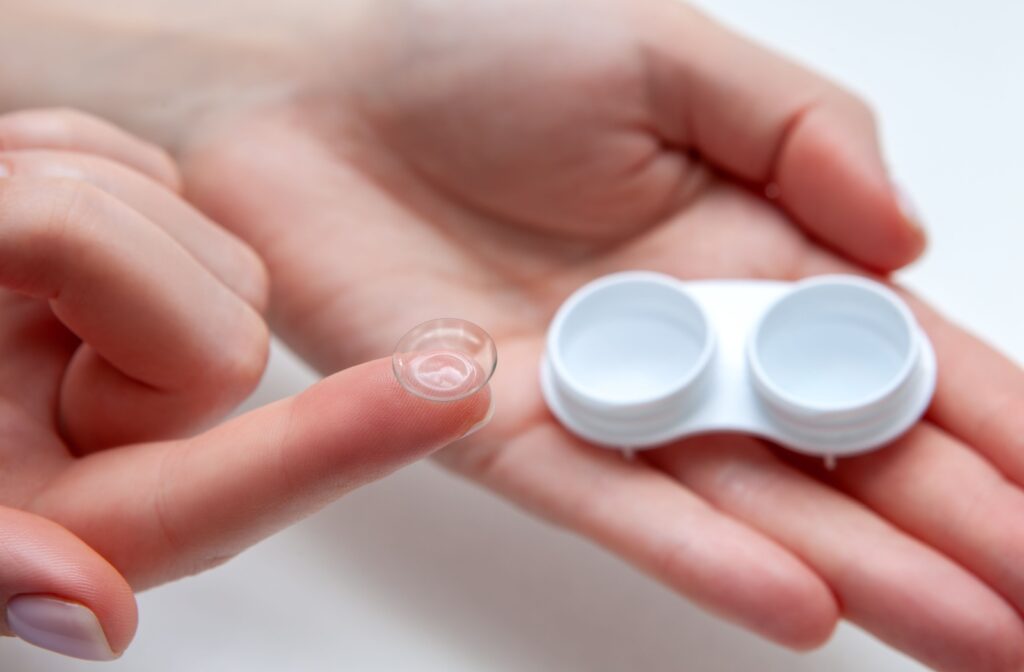Contact lenses are a great alternative to glasses. They’re easy to use, convenient, and comfortable. With contact lenses, you can enjoy clear vision without worrying about damaging an expensive pair of frames. But what do you need to know before trying contacts? Do they last forever, or do they expire?
Contact lenses do expire. Wearing them past their expiration date can significantly increase the risk of infections, corneal abrasions, and other ocular complications. Proper maintenance is key to keeping your vision clear, so always check your expiration dates!
The Different Types of Contact Lenses
The first thing to know about contact lenses is that the type matters. Different lenses are designed for different durations—each requires specific handling to reduce the risk of eye problems.
Some common kinds include:
- Daily disposable lenses. These are worn once and discarded (or recycled!) after a single use.
- Bi-weekly or monthly lenses. These can be reused for 2 weeks or a full month, depending on type, but only with proper cleaning and storage.
- Rigid gas-permeable lenses. These are longer-lasting lenses with a lifespan of up to 1-2 years when maintained properly.
There are even specialty options, like scleral lenses, that tend to require their own specific care instructions. However, no matter the type, they each have an expiration date. Maintaining your lenses is essential for preventing potential eye problems.
What Makes Contact Lenses Expire?
Contact lenses are made from advanced materials that are safe for wear, but they don’t last forever. Each type of lens, case, and contact cleaning solution comes with a clearly printed expiration date. This applies whether you’ve worn the lenses or not—unopened lenses can still be unsafe to wear.
The sterile packaging plays a key role in the safety of these lenses. Lenses are stored in sealed containers filled with a special solution that keeps them clean and usable. The seal on unopened lenses isn’t permanent, and when it weakens, the lenses can no longer be considered safe or sterile.
When an expired lens is placed in your eye, you’re exposing yourself to problems and ocular health risks, which may cause permanent vision loss. The shelf life will vary depending on your type of lens, so make sure you’re always checking the expiration date.
The Risks of Wearing Expired Contact Lenses
The risks of expired lenses are more than an inconvenience. When a lens is past its expiration date, it may lose its protective coating or be exposed to bacteria. Then, you’re at a significantly higher risk of severe eye problems.
Wearing expired contact lenses can lead to a higher risk of:
- Eye infections, including bacterial or fungal infections
- Corneal ulcers, which can cause pain and vision loss
- Irritation or discomfort due to degraded lens materials
- Increased risk of dry eye or allergic reactions
These can all cause long-term vision problems. Using expired contact lenses isn’t worth the potential damage—always check to make sure your lenses are still safe to use.
Tips For Maintaining Your Contact Lenses
Taking care of lenses properly is the key to keeping them clean and safe. It extends their lifespan and reduces the risk of all kinds of eye problems.

So try to make a regular habit of:
- Cleaning your lenses daily with the recommended solution (if you are using reusable lenses)
- Storing your lenses in a clean, disinfected case filled with fresh solution (if you are using reusable lenses)
- Avoiding wearing lenses longer than the recommended duration
- Replacing your lens case every three months to prevent bacteria buildup (if you are using reusable lenses)
Good habits, like cleaning and drying your hands before handling lenses, go a long way. They protect your eyes against bacterial exposure and reduce the risk of irritation. Plus, sticking to your replacement schedule means you’ll avoid unnecessary side effects.
How Often Should You Replace Your Contact Lenses?
Whether you regularly wear daily disposables or rigid gas-permeable lenses, you’ll eventually need to return to your optometrist for replacements. Regular contact lens fittings and exams are the key to keeping an up-to-date prescription. They’re also great for catching potential problems before they damage your vision, making them a core part of a proper eye care plan.
If you wear contacts, you should schedule an eye exam at least once a year. If your lenses are near their expiration date, it helps to plan ahead. Booking your next exam sooner rather than later gives your optometrist time to order your new pair before you run out of lenses.
Is It Time To Replace Your Contact Lenses?
Contact lenses have expiration dates for a reason. They are a medical device and need proper maintenance. Your eye health is too important to ignore expiration dates, so make sure to inspect the lenses regularly! Risks like infections or discomfort simply aren’t worth it, especially when replacement is straightforward.
If you think your lenses might be expired or it’s time for a change, reach out to our team. At Lake Country Optometry, we can help protect your eyes and vision—just like you deserve. Together, we can keep your vision clear, so book an appointment with us today!




